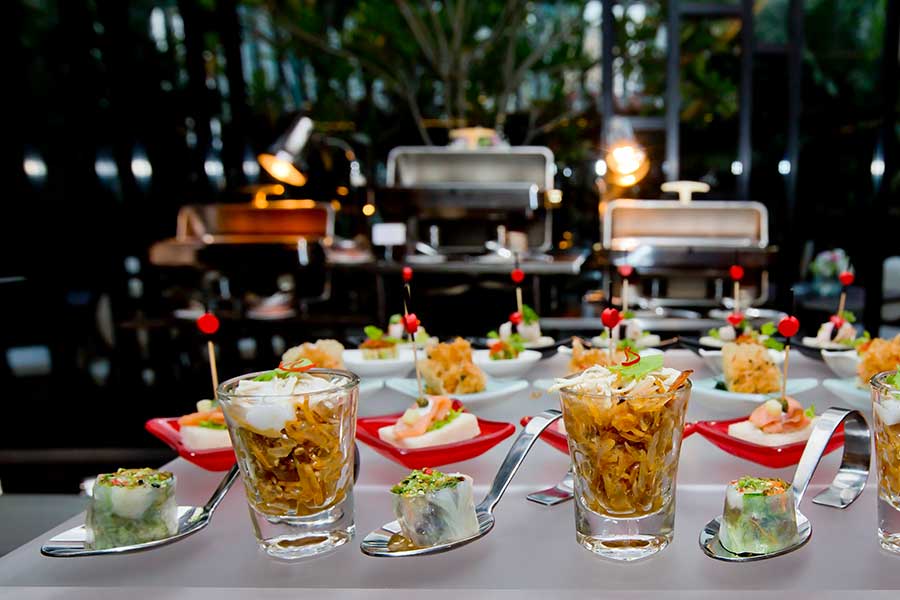The last thing anyone wants happening at their event is guests falling ill from unsafe food practices. If you’re organising for corporate catering or a private chef at your next event, we’ve created this guide to help you make sure they’re following safe food practices.
Top seven food safety questions for party catering:
- Who is your provider?
- Are you hiring a private chef?
- Is the commercial kitchen regularly inspected and vetted?
- Does the person delivering your catering have a Food Safety Supervisor certificate?
- Do they have insurance?
- What temperature will the food be stored and transported under?
- How long has food been stored in the danger zone?
Keeping in mind the info below will help you prevent the most common issues experienced by hosts when planning for party catering, and being aware of what to look for beforehand can help you prevent a disaster. Here’s to wholesome food that’s delicious, healthy, and cooked in a safe environment!
Party catering food safety FAQs
1. Who is your provider?
The first thing to consider is your provider. Are you going with a party catering company, a corporate catering company, or a private chef? Some things to think about after or while choosing your catering provider is the size of the company, their history, and whether there are customer reviews or testimonials with past experiences.
2. Are you hiring a private chef?
If you’ve chosen to hire a private chef, you should inquire about where they will be preparing the food for your event. If the chef is preparing your catering in a commercial kitchen, you’re good to go.
If the chef is preparing the meal at home, then beware. Commercial kitchens are subject to regulations and food safety rules, while home environments are unregulated and can, therefore, be unsafe. There will be no guarantee of cleanliness in a home environment.
3. Is the commercial kitchen regularly inspected and vetted?
If your food catering company or private chef is using a commercial kitchen to prepare your feast, you should check whether the kitchen is regularly inspected and has been vetted by the relevant food safety regulator. This is an important step for all event planners and ensures the safety of all guests.
If the commercial kitchen is not vetted or regularly inspected, it may be under a bad condition with unsafe food practices, posing one of the highest risks of food poisoning.
Corporate catering with a private chef.

4. Does the person delivering your catering have a Food Safety Supervisor certificate?
When planning catering with your company or private chef, you want to inquire whether the person delivering the food to your home or venue has a valid Food Safety Supervisor certificate. This certification means the person delivering the food has adequate knowledge on safe transportation, storage, and presentation of food ensuring for proper and safe delivery.
If you don’t have an answer or the person delivering the food doesn’t carry that certification, beware as they may have no clue as far as transporting, handling, and storing food safely and correctly.
5. Do they have insurance?
Always check whether your food catering company or private chef has insurance and whether that insurance covers your venue/home, bodily injuries, and the chefs themselves. This helps keep you protected in case of accidents, and you don’t want to be on the other side wishing you’d checked.
If your chosen catering company or private chef has no insurance or doesn’t cover the above, stay away as you’ll be working within an unregulated and potentially unsafe arena.
6. What temperature will the food be stored and transported under?
You want to ensure the food for your catering is stored and transported at the correct temperature or it poses a health risk. Food needs to be stored below 5℃ or above 65℃ in order to be safe and edible after 4 hours of storage.
Food stored between the temperatures of 5-65℃ (the ‘danger zone’) has the potential to grow unhealthy bacterias and be unsafe for consumption. It’s important you check with your catering provider beforehand to ensure food will be stored at the correct temperature before and during the event.
7. How long has food been stored in the danger zone?
If the food at your event has been presented or stored within 5-65℃, you must eat it immediately. If it’s been in the danger zone for longer than 4 hours then it must be disposed of or you’ll be putting your guests at risk of illness.
No party is fun when guests are falling ill because of the food. As an event planner, it’s up to you to ensure everyone has a good time – and that includes the often boring aspect of food safety. Keeping in mind the above, and asking all the right questions, will help make sure everyone walks out with the good kind of food coma and not the bad kind.
If you have any further questions regarding this subject, please do not hesitate to contact us on hello@chefin.com.au.